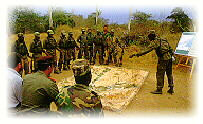This first non-South African contract entailed the training of mine security officials in a neighbouring African state in infiltration and penetration techniques targeted at organized crime syndicates. These officials, many of whom are still active to date, have played an invaluable role in countering crime aimed at damaging their company.
During the early 90s, EO was also approached by a South American Drug Enforcement Agency (DEA) to provide them with advice on countering the growing drug trafficking problem in South America.
 EO's advice was "take the problem to the producers" - a strategy which led to the formation and training of a highly specialized team of soldiers who would operate outside the normal military brief, working closely with the host DEA and police intelligence. These troops deployed clandestinely into drug-growing areas and conducted raids and strikes against the drug lords with great success. This term of counter-drug operations later became known as Discretionary Warfare.
EO's advice was "take the problem to the producers" - a strategy which led to the formation and training of a highly specialized team of soldiers who would operate outside the normal military brief, working closely with the host DEA and police intelligence. These troops deployed clandestinely into drug-growing areas and conducted raids and strikes against the drug lords with great success. This term of counter-drug operations later became known as Discretionary Warfare.
In 1993, EO was approached by SONANGOL, the Angolan Oil Parastatal, to provide a security team to protect the on-shore oil facilities in the coastal town of Soyo, whilst millions of dollars worth of oil-drilling and related equipment was being recovered.
During this period, EO had to ensure the logistics of its team from South Africa to Angola with two King Air Aircraft, each flight taking approximately 8 hours and often landing under intense direct and indirect rebel fire in Soyo.
EO's role in Soyo soon came to the attention of the Angolan Armed Forces (FAA). By this time (mid-1993) UNITA had effectively beaten the government forces on the battlefield and had mustered rebel control over more than 70 % of Angola. EO was awarded the contract to train the FAA's newly established 16th Brigade, a brigade which had been virtually destroyed by the SADF in the 1980s. This irony was not lost on EO !
 Elements of the newly trained brigade were soon rushed into action against the rebel forces and excelled themselves in battle. The brigade later captured strategic diamond mining areas held by UNITA, thus denying the rebels their major source of income. These actions by the 16th Brigade marked the beginning of the end for UNITA.
Elements of the newly trained brigade were soon rushed into action against the rebel forces and excelled themselves in battle. The brigade later captured strategic diamond mining areas held by UNITA, thus denying the rebels their major source of income. These actions by the 16th Brigade marked the beginning of the end for UNITA.
Additional units, trained by EO, utilized new tactics and training, launching raids and strikes at UNITA troop concentrations. Growing FAA morale and heavy UNITA casualties soon led to the signing of the LUSAKA protocols, effectively ending the long civil war in Angola.
In 1995, the ruling military council in Sierra Leone called on EO to provide assistance in countering their rebel threat in Sierra Leone. The Rebel Revolutionary United Front (RUF) had by then reached the outskirts of the capital Freetown. EO quickly restructured and retrained units of the Sierra Leone Defense Force (SLDF) and advised the SLDF to take the battle to the rebels. This caught the RUF off-guard and the SLDF rapidly gained the initiative, forcing the rebels to withdraw.
Using different tactics, the SLDF launched a series of strikes, raids, ambushes and offensives, inflicting heavy casualties on the RUF. As the rebel threat lessened, Sierra Leone was at last able to conduct a relatively peaceful election. This culminated in the ruling military council handing over the government to a civilian, democratically elected president in 1996.
EO left Angola in January 1996 and Sierra Leone in January 1997, having played a crucial role in ending two long-standing civil wars on the African continent.